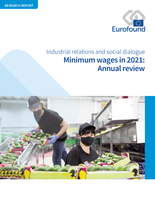Before COVID-19, the incidence of structural telework in the European Union was flat, at around 3% of all employees. In 2020, the rate jumped to 11% because of social-distancing measures. This shock is expected to have lingering effects as workers now demand more flexible working conditions, including the possibility to telework. This change is also taking place on the labour demand side, with employers increasingly advertising remote work possibilities.
Γλώσσες
Κύριο μενού
Ευρωπαϊκή Ένωση
Αρχική » Ευρωπαϊκή Ένωση
Υπηρεσίες του Ο.ΜΕ.Δ.
Οι υπηρεσίες του Ο.ΜΕ.Δ. παρέχονται στις συνδικαλιστικές οργανώσεις εργοδοτών και εργαζομένων καθώς και σε μεμονωμένους εργοδότες σε επίπεδο επιχείρησης που επιθυμούν να απευθυνθούν σε αυτόν. Μεταξύ των εργοδοτών συγκαταλέγεται και το Ελληνικό Δημόσιο, για τους εργαζόμενους με σχέση εργασίας ιδιωτικού δικαίου στις Δημόσιες υπηρεσίες, Ν.Π.Δ.Δ. και Ο.Τ.Α.
Υπηρεσίες
Στοιχεία επικοινωνίας
Διεύθυνση: Πλατεία Βικτωρίας 7, 104 34 Αθήνα
Τ: +302108814922
E: e-mail: [email protected]
Ωράριο λειτουργίας: Δευτέρα – Παρασκευή, 09.00 – 17.00
Πνευματικά Δικαιώματα - Όροι χρήσης
Copyright © 2014 Οργανισμός Μεσολάβησης & Διαιτησίας All rights reserved.
Unless otherwise stated, the content of this page is licensed Under Creative Commons Attribution-NonCommercial-ShareAlike 3.0


